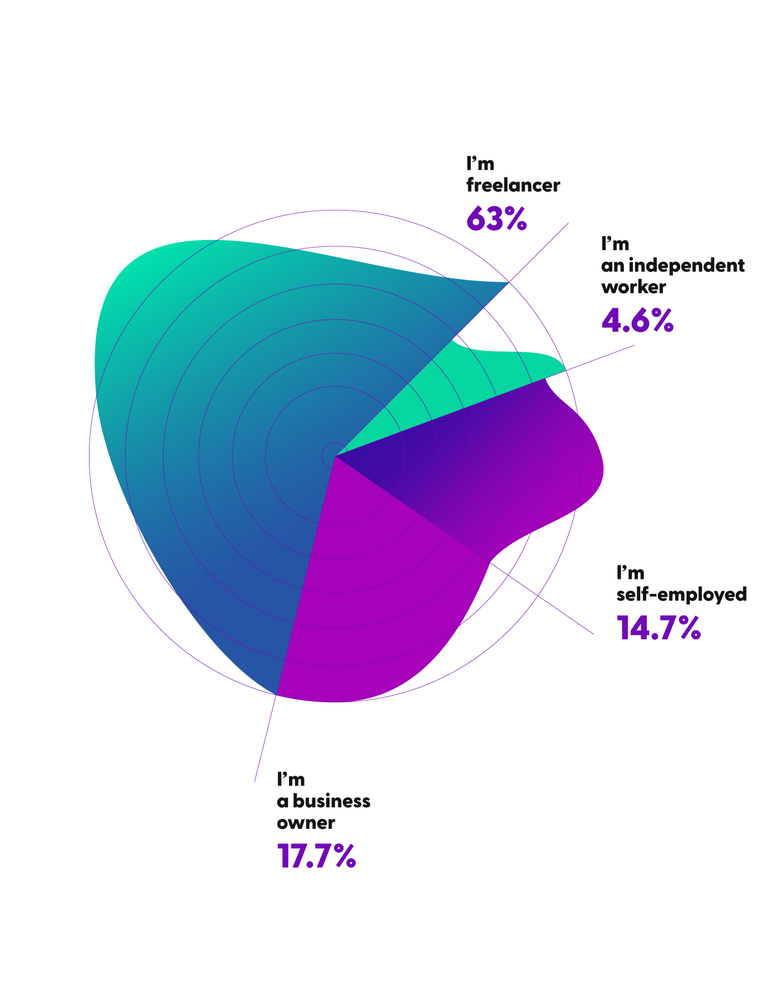It’s no secret that freelancing continues to gain traction. As many as a whopping 65 million Americans freelanced in 2020. Plus, freelancing has come a long way in gaining the recognition it deserves, with 71% of respondents in the 2019 Freelancing in America survey saying they believe freelancing has become more respected in recent years.
But even with the strides we’ve made, I’ll be the first to admit that freelancing can be a somewhat tricky and frustrating career to explain to others. There are still plenty of people who consider the term “freelancing” to be synonymous with unpredictability, insecurity, and instability.
As a result, many freelance professionals have sworn off the term “freelancer” entirely in favor of other titles that they believe establish more credibility. Independent worker or independent creative. Contractor. Self-employed. Business owner. Solopreneur. Consultant. You get the idea.

5 Tips to reclaim the word “freelancer” (and prove you know your stuff)
Here’s the thing: Assumptions and biases aside, a lot of us are sticking with the term “freelancer” (at least, if my own Twitter poll is any indication).

Personally, I have a huge amount of pride tied up in being a freelancer, and I want the label itself to represent independence and expertise rather than flightiness and volatility.
So, how do we make that happen? Well, it all comes back to us. Here are five strategies to prove you have your stuff together—regardless of what you decide to call yourself.
1. Know exactly what you offer
As a freelancer, the temptation to take whatever work comes your way is real. You’ll expand your services to fit an opportunity that lands in your inbox. You’ll take on various odd jobs. You’ll say “yes” to clients who aren’t a good match for you.
I get it, and I’ve been there. It seems counterintuitive to turn work away. But, if you continue to hop between services, clients, and types of projects, you’re far more likely to fuel the perception that freelancers are jacks of all trades but masters of none.
It’s sort of like going to a restaurant and seeing that they have everything from burritos or buffalo wings to lasagna or chicken pot pie on the menu. You don’t really trust them to do an amazing job at any one of those things, do you?
Instead, it’s better to get crystal clear on exactly what services you provide and what types of clients you work with. That clarity leads to a number of benefits, including:
- A more focused brand, reputation, and portfolio
- Greater expertise and credibility in your chosen area
- Higher-quality client referrals
- More fulfilling work that you actually enjoy
Remember, you don’t need every gig—you need gigs that are a good fit for you.
2. Ace your elevator pitch
Here’s a question that used to always make me cringe: So, what do you do?
I’m embarrassed to admit that my response usually went something like this: “Oh gosh, it’s sort of difficult to explain. Well, I’m a freelance writer. But not, like, books…”
Sigh. Not exactly the impressive introduction I was aiming for. Fortunately, over the years, I’ve managed to refine an elevator pitch that shares my freelance career with confidence. Here’s my go-to formula:
“I’m a freelance [profession] who works with [type of client] to produce [work] that [result].”
And here’s what that can look like when you fill in the blanks:
“I’m a freelance writer who works with productivity software companies to produce online content that improves their search result rankings and engages their readers.”
That’s a little better, isn’t it? If I still see a look of confusion wash over somebody’s face (trust me, it happens), I’ll usually give a real-world example to help them relate to what I do. Here’s what that can look like:
“So, if you were to Google ‘how to avoid distractions,’ what appears in your search results is the type of content I work with my clients to create.”
Usually, that inspires a major lightbulb moment for people, as they’re struck with the realization that I not only have a real and valuable career but that I’ve also likely created content that they’ve seen or consumed.

3. Refine your systems and processes
Let’s talk about the client-facing side of things for a minute. If working with you is a tangled mess of crossed wires and missed deadlines, you’re undermining the term “freelancer” and giving the whole profession a bad name. That sounds harsh, but it’s true.
One of the best ways to prove to your clients that you’re a true professional is to have organized systems and processes in place. You should be the one guiding them through how to work with you effectively, rather than relying on them to get you up to speed.
What processes do you need to have ironed out? At the bare minimum, you should know your typical steps for:
- Client onboarding: High-level overview of how you work, getting a signed contract, getting access to the tools and information you need, etc.
- Project workflow: How and when you’ll get the work done, how and when you’re reachable to your clients, how you’ll keep them in the loop on project progress, etc.
- Invoicing: How and when you’ll send your invoices, what payment methods you accept, when payment is due, etc.
You can save yourself time and ensure consistency by creating templates for common documents—from new client questionnaires to project proposals.
4. Polish your online presence
Like it or not, so much of your reputation lives online today. Your website and your social media accounts are huge pieces of your personal brand as a freelancer.
When prospective clients or even fellow freelancers search for your name online, you want to make sure the information they’re finding is up-to-date and an accurate representation of who you are as a freelance professional.
How do you make that happen? Here are a few tips to help you focus your energy on the most important areas:
- If you don’t already have a website dedicated to promoting and selling your freelance services, create one. Even a simple one is better than nothing.
- On your website, make sure you clearly state the services you offer and who they’re geared toward. That will help your ideal clients self-identify themselves.
- Optimize your bios and headlines on social media. State what you do in as plain of language as possible (i.e. “freelance writer” rather than “wizard of words”). It not only avoids confusion and demonstrates professionalism, but it also makes you far more likely to appear in search results.
- Set a recurring appointment to Google yourself. Every few months or so, open an incognito window, type your name into the search bar, and see what comes up. At this same time, see if you’re due to add some new work to your portfolio.
For as small as these changes seem, they can make a huge difference. After all, when you Google a business and see an obviously-outdated website, what’s your first impression? Probably not a great one.
The same is true for your freelance business. A polished and up-to-date online presence portrays you as a professional who doesn’t just deserve respect but demands it.
5. Strut your stuff
I get that bragging about yourself makes you want to crawl out of your skin. Me too. But, if you really want people to view you (and all freelancers) as qualified experts, you’re going to need to do a little shameless self-promotion every now and then.
What does this look like? It can take shape in a number of different ways, including:
- Actively sharing your recent work on your social media accounts
- Gathering client testimonials to feature on your website and social media
- Offering your expertise for various guest speaking engagements, podcasts, etc.
All of these show that you have real experience and a deep well of knowledge in your chosen focus area. And ultimately, there’s no better way to prove you know your stuff than to actually walk the walk.
Let’s take back the term “freelancer”
One of the many great things about being a freelancer is that you’re in control—and that applies to what you call yourself too.
Those who decide to stick with the term “freelancer” (myself included) want to be looked at as professionals who are worthy of respect rather than people who are half-heartedly completing odd jobs until a full-time role comes along.
But here’s the thing about respect: It doesn’t just happen—you earn it. And fortunately, the strategies we’ve covered here will help you say, “I’m a freelancer” with a sense of pride and confidence, rather than dread.




